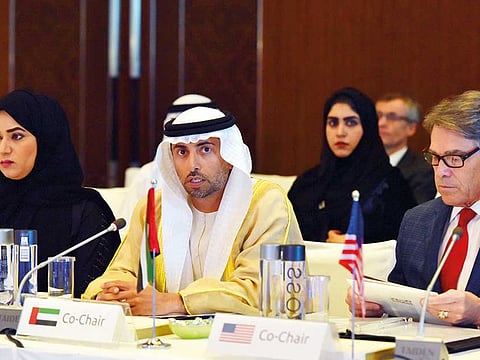Carbon capture projects need to scale up 100 times
Ministerial meeting discusses utilising money from fuel taxes to deploy carbon capture, utilisation and storage projects

Abu Dhabi: The carbon capture, utilisation and storage (CCUS) projects across the globe have to scale up 100 times to meet the existing environmental challenges, a top official said here on Wednesday.
The CCUS is the process of capturing and storing or re-using carbon dioxide from fossil fuel energy and industrial sources, which helps reduce CO2 emissions.
The proposals discussed [in a ministerial meeting in Abu Dhabi] will be presented to the governments for their approval to formulate policies and regulations [in this regard], said Suhail Mohammad Faraj Al Mazroui, the UAE Minister of Energy and Industry.
The UAE, the US and Saudi Arabia are already doing their best to scale up this technology. But we need to go for exponential growth [globally] if we have to achieve [the target of] reducing carbon emissions.”
“The UAE, the US and Saudi Arabia are already doing their best to scale up this technology. But we need to go for exponential growth [globally] if we have to achieve [the target of] reducing carbon emissions,” Al Mazroui told a press conference in the capital along with US Energy Secretary Rick Perry on the sidelines of the seventh ministerial meeting of the Carbon Sequestration Leadership Forum (CSLF) held on Wednesday.
The CSLF is the only ministerial-level international initiative focused on developing and deploying CCUS technologies globally.
Al Mazroui said the meeting discussed a proposal to utilise funds generated from fuel taxes [in those countries that have imposed tax on fuel] for deploying CCUS projects.
The minister pointed out that there are now 17 large projects in operation and four coming online in 2018, which together will more than double the number of operational projects since 2010.
Perry said the technological advancements in the CCUS sector is promising. Once the CCUS technology is broadly deployed, it will change the energy landscape, the US energy secretary said. It can help the developing nations in a big scale, he said.
The meeting’s communique said the world’s first large-scale bio-energy with the CCUS project in the US and the first fully integrated CCUS project in the steel industry in the UAE were the major additions since 2015. These two projects together are capable of capturing 37 million tonnes of CO2 per year.
Despite this progress, the International Energy Agency (IEA) says the rate of deployment of CCUS must increase by an order of magnitude to achieve its 2025 targets under a 2 Degree Scenario (2DS) and says it will require up to $4 trillion of investment in CCUS between now and 2050.
The five-day meeting ends on Thursday with delegates visiting Al Reyadah CCUS Project at Emirates Steel Industries Facility in Abu Dhabi.
Al Reyadah project
Al Reyadah, a company focused on exploring and developing commercial scale projects for CCUS, was launched in November 2016 as part of Abu Dhabi’s initiatives to reduce carbon emissions and support greener forms of energy.
A joint venture between Abu Dhabi National Oil Company (Adnoc) and Masdar, Al Reyadah’s facility in Musaffah captures up to 800,000 tonnes of carbon dioxide emitted from Emirates Steel factory annually to transfer it to oilfields for enhanced oil recovery operation.
The total investment in the project is Dh450 million. The new project consists of three stages mainly in industrial capture of the carbon dioxide from Emirates Steel factory and in the second stage the captured gas is compressed and dehydrated. The final stage involves the transportation of the compressed gas via a 42km pipeline for injection into Adnoc onshore oilfields in Rumaitha and Bab for enhanced oil recovery.



